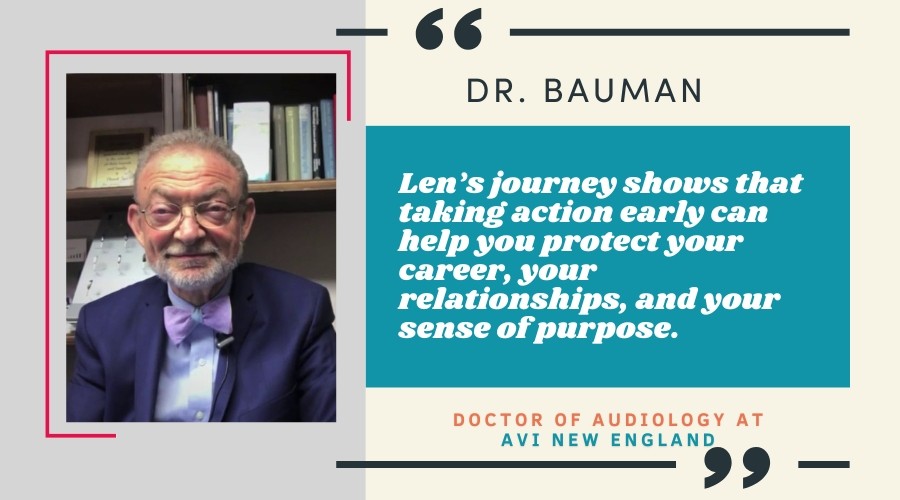
|
Dr. Natan Bauman
|
Oct 25, 2021
Most people have no idea what happens at a hearing test, and they can be nervous about this step into the unknown.
So, I’d like to give you a walkthrough as to what happens at a hearing test to dispel any fears.
A Few Questions First
Before the testing, we start with a consultation. Asking questions such as “what is your present hearing status and what kind of hearing difficulties you are experiencing”. Also, we ask for your medical history as it relates to hearing – what is your familial hearing history and do you have any history of noise exposure or use of any medication which can affect your hearing. Additionally, we ask questions related to your balance/dizziness or tendency to fall.
Next we inspect your ear canal because we want to make sure that the ear is not impacted with earwax.
We then ask a few questions regarding your perceived status of your hearing before conducting the test.
The Steps Of A Hearing Test
1. What Happens? Is It Going To Hurt?
First of all, I'd like to reassure you that there is no pain associated with this test.
It's a relatively simple process done by an audiologist or hearing care expert. You will be asked to place headphones over your ears, or sometimes we use inserts that are put directly into your ear canal – all of which are painless.
2. Listening To Tones And Pitches
You are then asked to listen to a series of different sounds that represent different pitches at various volume levels.
Think about pitches as if they are on piano keys or a keyboard.
On the left-hand side, you have the boom-boom or bassy sound.
In the middle of your keyboard or the piano keys, you have the middle-range pitch sounds.
On the right-hand side, you have the sounds that are referred to often as treble sounds. Those are high-pitched sounds.
Each time you identify the presence of a sound, you indicate that you heard the sound.
The task is to identify the softest sound that you can possibly hear. That softest sound is then placed on a special form called an audiogram. We mark that for all the different pitches and identify the degree of your hearing in relation to normal hearing.
The normal level of hearing is represented by the zero line. Everything that is below that line represents how much hearing you have lost in relation to normal hearing. That is one part of the test.
3. Listening To Speech
We also want to know how well you can understand speech, because that's what it's all about.
This part of the evaluation is when we present a certain group of single words to you at different volumes.
If the words are presented too softly, or even too loudly, you might not be able to understand the words. We want to make sure that we really get your optimal hearing level – the best listening level for you.
4. Bone Vibrations
One more part to evaluating your hearing is presenting sounds either through your headphones or through the inserts at the opening of your ear canal. The sound travels through your ear canal, through your eardrum, through your middle ear, and so forth.
We also put something behind the ear to assess bone-transmitted sound. The sound directly bypasses the outer ear, the ear canal, the eardrum, and the middle ear and is submitted directly into the inner ear.
The difference between both ways of testing your hearing, via headphones versus through the device placed behind your ears, allows us to assess any problems in the ear canal, with the eardrum or the transmission through the middle ear such as fluid impaction.
In Summary
So that's the basic hearing test. It takes no more than about thirty minutes.
If your hearing loss is such that you become a candidate for hearing aids, then we perform some other tests that are related to what we're looking for in terms of fitting you with some of the hearing aids that are the best suited for you.
All of this is simple, painless, and almost a very pleasant experience – something that one should do if there is a suspicion of a hearing deficit before it gets worse.
To schedule your hearing test with us, or to find out more about the process, you can contact us by filling out our online form or call us at (475) 227-0842.
We look forward to walking with you on your hearing journey.





















